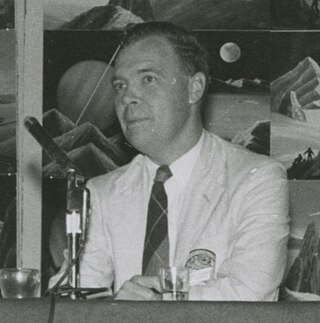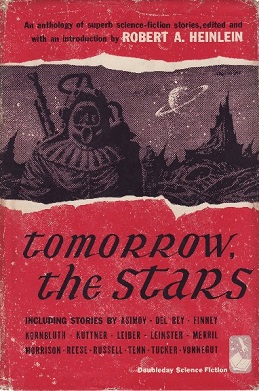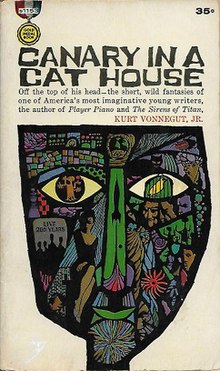
Harry Clement Stubbs, better known by the pen name Hal Clement, was an American science fiction writer and a leader of the hard science fiction subgenre. He also painted astronomically oriented artworks under the name George Richard.

Kurt Vonnegut was an American author known for his satirical and darkly humorous novels. He published 14 novels, three short-story collections, five plays, and five nonfiction works over fifty-plus years; further collections have been published since his death.

Theodore Sturgeon was an American fiction author of primarily fantasy, science fiction, and horror, as well as a critic. He wrote approximately 400 reviews and more than 120 short stories, 11 novels, and several scripts for Star Trek: The Original Series.

Philip José Farmer was an American author known for his science fiction and fantasy novels and short stories.

Shirley Hardie Jackson was an American writer known primarily for her works of horror and mystery. Her writing career spanned over two decades, during which she composed six novels, two memoirs, and more than 200 short stories.

Collier's was an American general interest magazine founded in 1888 by Peter Fenelon Collier. It was launched as Collier's Once a Week, then renamed in 1895 as Collier's Weekly: An Illustrated Journal, shortened in 1905 to Collier's: The National Weekly and eventually to simply Collier's. The magazine ceased publication with the issue dated the week ending January 4, 1957, although a brief, failed attempt was made to revive the Collier's name with a new magazine in 2012.

Welcome to the Monkey House is a collection of 25 short stories written by Kurt Vonnegut, published by Delacorte in August 1968. The stories range from wartime epics to futuristic thrillers, given with satire and Vonnegut's unique edge. The stories are often intertwined and convey the same underlying messages on human nature and mid-twentieth century society.
Lewis Padgett was the joint pseudonym of the science fiction authors and spouses Henry Kuttner and C. L. Moore, taken from their mothers' maiden names. They also used the pseudonyms Lawrence O'Donnell and C. H. Liddell, as well as collaborating under their own names.

Irwin Shaw was an American playwright, screenwriter, novelist, and short-story author whose written works have sold more than 14 million copies. He is best known for two of his novels: The Young Lions (1948), about the fate of three soldiers during World War II, which was made into a film of the same name starring Marlon Brando and Montgomery Clift, and Rich Man, Poor Man (1970), about the fate of two brothers and a sister in the post-World War II decades, which in 1976 was made into a popular miniseries starring Peter Strauss, Nick Nolte, and Susan Blakely.

Bagombo Snuff Box is a collection of 23 short stories written by Kurt Vonnegut. The stories were originally published in US periodicals between 1950 and 1963, and consisted of virtually all of Vonnegut's previously published short fiction of the 1950s and 60s that had not been collected in 1968's Welcome to the Monkey House. This collection was published in 1999 by G. P. Putnam's Sons.
"Report on the Barnhouse Effect" is the first short story written and published by American writer Kurt Vonnegut. It originally appeared in the February 11, 1950 issue of Collier's Weekly. In 1952, the story was included in the science fiction anthology Tomorrow, the Stars, edited by Robert A. Heinlein. It is also part of the collection Welcome to the Monkey House, published in 1968.
"All the King's Horses" is a short story written in or before 1951 by Kurt Vonnegut. It can be found in his collection of short stories Welcome to the Monkey House. It derives its title from a line in the Humpty Dumpty nursery rhyme.

Tomorrow, the Stars is an anthology of speculative fiction short stories, presented as edited by American author Robert A. Heinlein and published in 1952.
The science fiction writer Robert A. Heinlein (1907–1988) was productive during a writing career that spanned the last 49 years of his life; the Robert A. Heinlein bibliography includes 32 novels, 59 short stories and 16 collections published during his life. Four films, two TV series, several episodes of a radio series, at least two songs and a board game derive more or less directly from his work. He wrote the screenplay for Destination Moon (1950). Heinlein also edited an anthology of other writers' science fiction short stories.
"Tomorrow and Tomorrow and Tomorrow" is a short story by Kurt Vonnegut originally written in 1953. It was first published in Galaxy Science Fiction magazine in January 1954, where the story was titled "The Big Trip Up Yonder", which is the protagonist's euphemism for dying. A revised version bearing the title "Tomorrow and Tomorrow and Tomorrow" appeared in Vonnegut's collection of short stories, Canary in a Cat House (1961), and was reprinted in Welcome to the Monkey House (1968). The new title comes from the famous line in Shakespeare's play Macbeth starting "Tomorrow and tomorrow and tomorrow".
Tomorrow and tomorrow and tomorrow is a famous quotation from Shakespeare's play Macbeth.
"Mnemonics" is a short story by Kurt Vonnegut, first published on 28 April 1951 in Collier's, and later in Bagombo Snuff Box in 1999.
This is a complete list of works by American science fiction and fantasy author Jack Vance.

Complete Stories is a 2017 collection of most of Kurt Vonnegut's previously published short stories, and several that were previously unpublished. The collection is introduced with a foreword by Dave Eggers, and is edited by Jerome Klinkowitz and Dan Wakefield.











